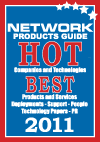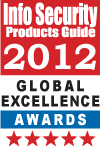NCP engineering is proud to announce that it has been named a finalist in the IPsec/SSL/VPN category of Info Security Products Guide’s 2013 Global Excellence Awards. The NCP Secure Enterprise Solution was once again recognized for its superiority in providing comprehensive security to companies with large, complex remote access environments.
Designed to make secure remote access simple, the NCP Secure Enterprise Solution is a centrally managed software
solution that provides IT staff with total end-to-end security, unlimited scaling, complete policy freedom and multiple VPN system setup and control. Comprised of the NCP Secure Enterprise Client, the NCP Secure Enterprise VPN Server and NCP Secure Enterprise Management (SEM), the solution is interoperable with all major network-layer security technologies, including VPN gateways and firewalls.
The information security research and advisory guide’s recognition of NCP further demonstrates the company’s market leadership, having recently been named a finalist in the 2013 SC Magazine Reader Trust Awards for its SEM 3.0. Patrick Oliver Graf, general manager, Americas commented on this sustained momentum: “It’s an honor to be recognized by Info Security Products Guide and continue our streak of awards. This distinction is a testament to our holistic remote access VPN solution, which continues to meet the demands of today’s increasingly mobile workforce while fulfilling enterprises’ security and management requirements.”
Stay tuned, as the winners of Info Security Products Guide’s 2013 Global Excellence Awards will be announced at a banquet dinner in San Francisco on February 27, 2013.








SearchNetworking: NCP Explains Mobile Device Management v. Enterprise Application Stores
Posted: January 31, 2013 in Expert Q&A, Industry Commentary, MobileTags: automated mobile security, Enterprise IT, enterprise security, mobile device, mobile device management, Mobile Security
*Editor’s Note: This column originally appeared in TechTarget’s SearchNetworking.com
By Rainer Enders, CTO, Americas, NCP engineering
Both systems can enhance mobile device security at different levels. Typically, a mobile device management system provides for standard device management features such as configuration management, backup capabilities and remote wipe, along with logging and reporting. The enterprise application store provides for the capability to safely test and deploy chosen applications. As such, the company has greater control over the mobile device application environment. It can ensure the integrity and security of the applications as well as deliver a better user experience along with greater productivity. Meanwhile, enterprise application stores can be a particular advantage for heterogeneous device platforms.
Share this: